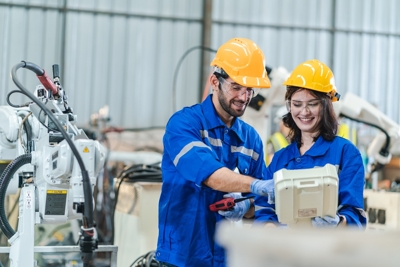
Sustainable manufacturing is no longer just an ethical choice, it’s a strategic necessity for SMEs and micro manufacturers in the East Midlands.
By integrating sustainable practices, manufacturers can reduce waste, lower carbon emissions and improve efficiency, all while staying competitive in an increasingly eco-conscious market. In addition to meeting regulatory requirements, embracing sustainability leads to smarter resource management and long-term resilience.
So, how can manufacturers reduce waste and carbon emissions while driving sustainability?
1. Optimise supply chain logistics
Transportation is a significant contributor to carbon emissions in manufacturing. By using route optimisation software and consolidating shipments, manufacturers can cut fuel consumption and reduce costs. A study by the Carbon Trust found that these strategies can lower transport emissions by up to 30%. In the East Midlands, working with local suppliers can also reduce transport distances, cutting both emissions and lead times.
2. Embrace circular economy principles
The traditional "produce, use, dispose" model leads to unnecessary waste. Adopting a circular economy approach, which focusses on reuse, recycling, and remanufacturing, can significantly reduce environmental impact. For example, Toyota UK, based in the East Midlands, has implemented closed-loop recycling, reducing waste by over 90%. SMEs can follow suit by partnering with suppliers focussed on recyclability and designing products for easier disassembly and reuse.
3. Adopt Digitalisation for waste reduction and efficiency
Digital transformation is key to reducing waste and improving operational efficiency. Smart technologies, such as IoT sensors, predictive analytics, and AI-driven forecasting, help manufacturers optimise their supply chains by reducing overproduction and material waste. By adopting these tools, makers can achieve efficiency gains of up to 25%, helping them track material usage and identify inefficiencies. This data-driven approach leads to smarter, more sustainable decisions.
4. Implement lean manufacturing principles
Lean manufacturing focuses on eliminating waste and improving processes. A study of 119 SMEs in the Midlands showed that combining lean principles with process innovation significantly boosts sustainability performance. Streamlining processes reduces material usage and energy consumption, providing both environmental and economic benefits. By adopting lean practices, manufacturers can increase efficiency and lower waste.
5. Engage in continuous improvement and collaboration
Sustainability is a continuous journey. Regularly reviewing processes, collaborating with other businesses and seeking support can lead to shared resources and knowledge. This collective approach improves the ability to implement effective waste reduction strategies and reach sustainability goals.
For those looking to improve their sustainability, Made Smarter East Midlands offers fully funded support and matched grant funding for digital transformation. By registering, you can access tailored resources to help you adopt the best sustainable practices.
Ready to transform your manufacturing processes? Register now for support and funding with Made Smarter: https://www.madesmarter.uk/start-your-digital-manufacturing-journey/
By adopting these digital tools, SMEs and micro manufacturers in the East Midlands can boost both sustainability and competitiveness.


